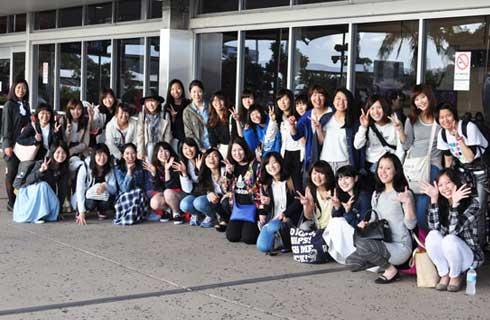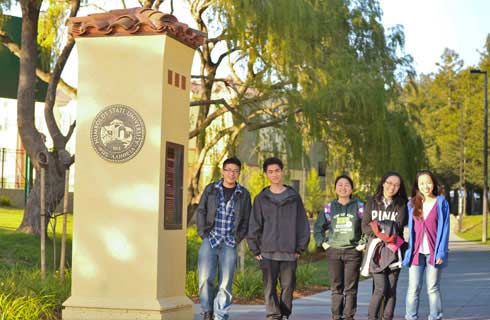- IDP China>
- 课程库>
- 教育学>
- 教育>
- 特殊教育>
- Bachelor of Science in Education in Special Education - Moderate/Intensive Educational Needs
特殊教育学士学位-中度/强化教育需求
Bachelor of Science in Education in Special Education - Moderate/Intensive Educational Needs

学历文凭
Bachelor Degree

专业院系

开学时间

课程时长

课程学费

国际学生入学条件
Secondary School Transcripts/detailed mark sheets (Certified English translation and original language)
To qualify for a teacher education program, freshman applicants must have at least a 2.75 cumulative high school grade point average (on a 4.0 scale).
TOEFL iBT - 71, IELTS - 6.0, TOEFL PBT- 525 pBT(discontinued as of July 2017), 18 average of Revise PBT
On SAT, a minimum of 510 Evidence-based reading and writing / ACT, a minimum of 21 in English
IDP—雅思考试联合主办方

雅思考试总分
6.0
- 雅思总分:6
- 托福网考总分:71
- 托福笔试总分:525
- 其他语言考试:PTE Academic score of 48<br>MELAB score of 75
CRICOS代码:
申请截止日期: 请与IDP联系 以获取详细信息。
课程简介
A bachelor's degree in special education (SPED) is typically sought by students who want to become special education teachers, although some graduates may work with individuals with disabilities in non-school (e.g., residential or vocational) settings. Students majoring in SPED will learn about evidence-based strategies to work with individuals with disabilities in diverse settings and across systems of support. Coursework includes content specific to teaching and adapting academic content for students with disabilities, assessment and the development of Individualized Education Plans (IEPs), classroom and behavior management strategies, family and professional collaboration, educational and assistive technology for students with disabilities, and understanding the development of students with disabilities. Special educators (sometimes also referred to as Intervention Specialists) teach individuals with many kinds of disabilities including learning disabilities, emotional and behavioral disorders, ADHD/other health impairments, intellectual disabilities, autism spectrum disorder, hearing impairments, and multiple disabilities.<br><br>The Moderate/Intensive Educational Needs concentration is designed to provide coursework and field experiences necessary to become licensed through the State of Ohio to teach students who require intensive and ongoing special education support. Most often, these will be students with intellectual disabilities, autism spectrum disorder (ASD), multiple disabilities and complex health impairments. Students with moderate/intensive (MI) educational needs generally do not fully participate in the general education curriculum and instead require access to a modified curriculum and/or other extensive special education (SPED) supports. Although MI students may participate in general education classrooms for parts of their day, they are more likely to receive their special education supports within small groups or individually in settings such as resource rooms, or classrooms or programs developed specifically for students with disabilities. Moderate/intensive special educators teach a broad range of skills including academics, adaptive and life skills, self-regulation, and leisure and social skills. To ensure generalization of skills learned in the classroom, MI teachers also focus on community based instruction, especially during the middle and high school years.
相关申请
 预科
预科 奖学金
奖学金 实习机会
实习机会 在校学习
在校学习 跨境学习
跨境学习 校园授课-线上开始
校园授课-线上开始 在线/远程学习
在线/远程学习
开学时间&学费
学费信息仅供参考,请与IDP联系以获取详细信息
| 开学时间 | 时长 | 学费 | 地点 |
|---|---|---|---|
| 暂无 | 暂无 | 暂无 | 暂无 |
学校排名

世界排名501
数据源:
泰晤士高等教育世界大学排名
关于肯特州立大学

俄亥俄州肯特州立大学将世界各地聪明睿智的学生汇聚在一起。整个学生群体中大约有5%的学生是国际学生,分别来自中国、巴西、沙特阿拉伯、印度、尼日利亚和韩国等国家。肯特州立大学始建于1910年,当时是一所教师培训学校。从那时起,该校便一直在推动着经济和文化变革。如今,该校因世界一流的师资、设施和研究而远近闻名。学生和教师共同打破界限,发现新的思维方式。该校下设11所学院,每所学院都面向各种类型的学生开设有涵盖人文、科学、教育、商业、健康等领域催人奋进的课程。地理环境肯特市有大量有趣的活动,让学生能够获得极其出色的美国大学求学体验。这其中包括现场音乐、喜剧、节日和高校运动会等等。肯特位于俄亥俄州,距离克利夫兰及其他一些繁华的大城市很近。学生课余时间有许多娱乐活动,比如听音乐会、参观博物馆、游览公园、动物园以及参加体育活动。该地区附近有很多自然美景,学生可以参加钓鱼、徒步旅行、航海或骑自行车等活动,在温暖的夏天和白雪皑皑的冬天愉快地度过大学生活。
本校相关课程

应用数学理学硕士
学历文凭
Masters Degree
开学日期
课程费用总额


会计理学硕士
学历文凭
Masters Degree
开学日期
课程费用总额


表演音乐硕士
学历文凭
Masters Degree
开学日期
课程费用总额


Master of Music in Conducting
学历文凭
Masters Degree
开学日期
课程费用总额


Master of Liberal Studies
学历文凭
Masters Degree
开学日期
课程费用总额


视觉传达设计美术硕士
学历文凭
Masters Degree
开学日期
课程费用总额

其他相关课程

Bachelor of Science in Early Childhood Education and Master of Science in Education in Special Education
 佩斯大学
佩斯大学学历文凭
Bachelor Degree
开学日期
课程费用总额


Master of Education - Special Education
 南卫理公会大学
南卫理公会大学学历文凭
Masters Degree
开学日期
课程费用总额


特殊教育教育硕士-普通特殊教育
 贡萨加大学
贡萨加大学学历文凭
Masters Degree
开学日期
课程费用总额


Bachelor of Science in Special Education - SE Interventionist History [6 to 12]
 田纳西理工大学
田纳西理工大学学历文凭
Bachelor Degree
开学日期
课程费用总额


Post-Baccalaureate Endorsement Program with Special Education- Adapted Curriculum K-12
 欧道明大学
欧道明大学泰晤士高等教育世界大学排名:914
学历文凭
Masters Degree
开学日期
课程费用总额


Bachelor of Arts in Special Education
 马歇尔大学 - INTO USA
马歇尔大学 - INTO USA学历文凭
Bachelor Degree
开学日期
课程费用总额










